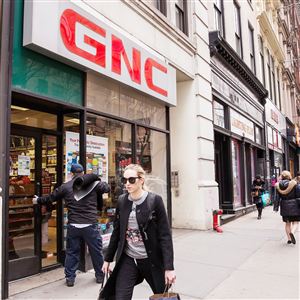What do vitamins and supplements have to do with national security?
Apparently, more than one might think.
Early Thursday, Pittsburgh health and wellness retailer GNC said the federal panel that reviews investments by foreign entities in U.S. companies has given its blessing for GNC’s planned partnership with Harbin Pharmaceutical Group in China.
Within the opening bell’s first hour, the Pittsburgh-based health and wellness retailer’s shares were up more than 25 percent — at one point gaining 80 cents on its $2.89 close Wednesday. The shares closed at $3.65 Thursday.
Thursday’s share price bump signals shareholders are more hopeful for a deal now that the Committee on Foreign Investment in the United States, or CFIUS, decided, “There are no unresolved national security concerns” regarding the transaction.
But that follows months of waiting for the go-ahead.
The Committee on Foreign Investment, which was created in 1975 to review foreign investment in U.S. companies, is chaired by the U.S. Secretary of the Treasury and also includes department heads from justice, homeland security, commerce, defense, state and energy.
It has historically has looked askance at transactions that involve the foreign acquisition of technology or intellectual property that could pose a threat to America’s national security and it has moved to block those deals.
Of late, transactions that included Chinese investors have appeared in a disproportionate share of the committee’s denials — an April analysis posted on the American Action Forum website reported that eight of the previous 10 CFIUS denials involved planned deals with Chinese investors.
The denials, it said, “correspond with a rise in Chinese investment in the United States and growing concern over transactions between U.S. and Chinese companies.”
With the U.S. and China now engaged in a growing tariff skirmish, “Any investment coming to the U.S. from China at this time will be more closely reviewed by the Trump administration,” said Dennis Unkovic, an international business attorney with the Downtown firm of Meyer, Unkovic & Scott.
“Trump is clearly targeting China as the bad guy in international relations,” he said Thursday, adding that the issue goes well beyond the GNC-Harbin deal. “It’s a question of whether the U.S. economy will remain open to foreign investment in the future.”
Last month, President Donald Trump signed into law an act that gives the Committee on Foreign Investment a larger role in reviewing foreign investments, Mr. Unkovic wrote in a soon-to-be-published journal article.
The change, he wrote, “will likely make it more difficult for foreign companies to successfully invest in the United States if U.S. national security interests are potentially at risk.”
While the GNC-Harbin partnership carried no obvious national security risk, shareholders may have grown restless as six months ticked by with no word from the committee. The review process, Mr. Unkovic said, typically takes about 60 days unless the committee has questions or concerns.
At one point last month, GNC shares hit a 52-week low at $2.71.
Companies are not required to seek a CFIUS review, but Mr. Unkovic said GNC was wise to do so. The committee, as well as the president, have the authority to block the transaction or undo it later.
Even with the go-ahead now from CFIUS, the GNC-Harbin deal still needs formal approval by Chinese regulators. But the road to a completed deal just got smoother.
If all goes well from here, GNC will see a nearly $300 million investment from Harbin -– making it GNC’s largest shareholder. That will be used to pay down debt.
Harbin, which is also known as Hayao, will then manufacture, market, sale and distribute GNC-branded products in China. Also as part of the deal, GNC’s board will expand to 11 members that will include five selected by Harbin.
GNC’s announcement Thursday said it is still targeting a finalized agreement by year’s end.
Steve Twedt: stwedt@post-gazette.com or 412-263-1963.
Updated at 4:55 p.m. Sept. 13, 2018
First Published: September 13, 2018, 2:16 p.m.

















